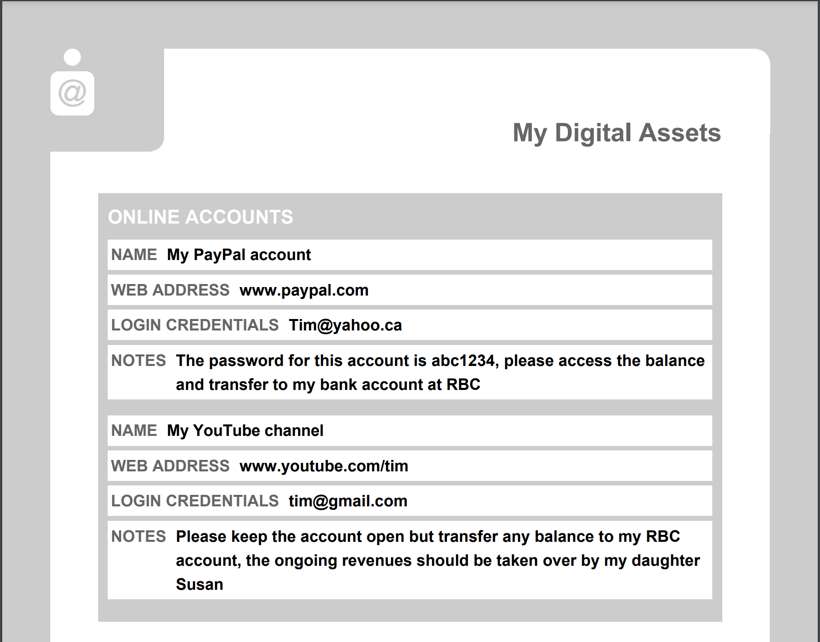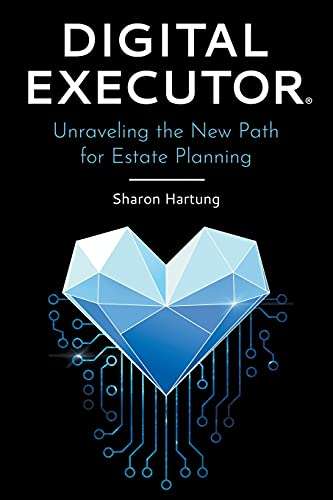The law pertaining to Wills has been in place for almost 200 years. Over that time, very little has changed in the requirements to create a legal Last Will and Testament. The law has always stated that a Will must be written on paper and signed in ink in the presence of two witnesses, who must also sign the document in ink in the presence of each other. But over the last 20 years we have seen the emergence of online Will services, Digital Wills, and Electronic Wills. The definitions of these modern Wills have been evolving, and cause a great deal of confusion. In this article we would like to explain the differences between these documents.
Summary
An Online Will
A document written by an online Will writing service, but then downloaded and printed to be signed in the presence of two witnesses. It’s a Will writing service offered online. There isn’t really such a thing as an Online Will, other than the Electronic Will described below.
A Digital Will
A document that describes the handling of your digital assets, including those of financial value and those of sentimental value. These can range from social media accounts to cryptocurrencies. This is described outside of your traditional Last Will and Testament, and usually appoints somebody to manage this activity (i.e. your “Digital Executor”).
An Electronic Will
A document that is signed electronically by yourself and by your two witnesses. The signing is usually completed remotely via video link, and the document can then be stored electronically in the cloud. At the time of writing, British Columbia is the only Province that legally accepts an electronically signed and stored Will.
Traditional Wills
There are a few variants on the traditional Will that need to be explained before we get into the topic of “modern Wills”.
The Holographic Will
A holographic Will is written entirely in the testator’s own handwriting. What makes this document special is that in some Canadian Provinces, the signing of the document does not need to be witnessed. The idea behind this is that it can be used if you were in a truly desperate situation. If you needed to prepare your Will knowing that death was imminent, it may not be practical to gather two witnesses to watch you sign the document. The law allows you to write your own Will in your own handwriting, and accepts this as a legal document even if no witnesses were present. The following Provinces accept a fully handwritten Will with no witness signatures: Alberta, Ontario, Manitoba, Quebec, New Brunswick, Newfoundland, and Saskatchewan. British Columbia is noticeably absent from this list.
It is important to note that this doesn’t mean handwritten Wills are not accepted by the other Provinces. All Provinces accept handwritten Wills as legal documents, but they require two witness signatures in order to be legally accepted.
The “Oral Will”
This is when somebody promises you something from their estate. Perhaps no Will was written, but the deceased promised you their gold watch. In fact, they always told you that one day it would be yours.
Verbal promises and spoken Wills are not valid in Canada, and they do not count for anything. An oral Will (also called a nuncupative Will) is legally accepted by some jurisdictions in very special circumstances. For example, in the UK, an active service member can verbally share their wishes from the battlefield and these wishes would be legally accepted.
In Canada, oral Wills, or even video Wills, are not legally valid. Generally speaking (and we will get to the exceptions), Canadian law requires a Will to be on a piece of paper, and signed in ink.
What is an Online Will?
This is where things start to get a little confusing. We hear this a lot: “I’ve been told that an online Will is not legal”. But what is an online Will?
We regard an online Will as a Will prepared using an online Will service. There isn’t really such a thing as an “online Will”, but there are plenty of online Will services. LegalWills.ca allows you to prepare your Will online, but the service generally requires you to download and print your final document, and then sign this in the presence of two witnesses (we will get to the exceptions later).
The service at LegalWills.ca allows you to step through a series of questions on your computer, iPad, or smartphone. It is customized to your Province and interactive. For example, if you have minor children, it will guide you through the process of naming guardians and setting up trusts. If you have left out a family member, the service will warn you.
But the online version is not signed. It is there for your convenience to keep the document updated. Any time you make a change to the information, you must re-compile your document. Then you must download the document again, and re-sign the document in the presence of two witnesses. Even though you have prepared the document yourself, it does not qualify as a holographic Will because it is typed. So you still require two witnesses to watch you sign.
An online Will according to our definition is no different than any other typed, signed, and witnessed document, other than the fact that it was prepared online.
What is a Digital Will?
The term “digital Will” has been largely adopted to describe the effort to catalog your digital assets and plans for your digital assets in your Will.
Digital assets come into three general categories:
- Items stored online that have no financial value but should probably be passed onto somebody to manage. This would include things like online photo accounts, videos, and social media accounts.
- Items kept online that may have real ongoing value: revenue from a YouTube channel, an Instagram account, domain names, Blog revenues, or Amazon affiliate revenues.
- Online accounts that hold financial assets: online gambling accounts, a Paypal account, Stripe or Wise accounts, and online investment accounts (this does not include a login to a real brick and mortar bank account, which although you may access it online, is a financial asset in real life!)
- Cryptocurrencies including NFTs.
In a digital Will, you can include instructions for the handling of these accounts. Clearly, a balance from a PartyPoker account should be withdrawn and added to the estate. But what about a domain name? A domain name could perhaps have a beneficiary named. It has real value, and would simply expire if no instructions were left to loved ones.
We then move into a very fuzzy area of things like a killer twitter handle. It may not be too much of a reach to imagine a family twitter handle causing fighting between children – “you can have the wedding ring, but I want the @jones twitter handle”.
This is a complicated topic, because many service providers have their own rules for what can and cannot be done with an account. Apple has very recently allowed a Legacy Contact to be set up for your iCloud account.
Most social media accounts are licensed and not owned, even your iTunes and Kindle library. So you can leave instructions for the handling of the account, but you cannot pass on the contents of the account to a beneficiary.
Facebook now allows you to set up a Legacy Contact for your Facebook (Meta) and Instagram accounts. This person is designated by you, and has the power to memorialize your account.
So what exactly is a Digital Will?
The handling of this information does not belong in a traditional legal Last Will and Testament (contrary to many online resources). Your Will would very quickly become unworkable if it included directions for the handling of all of your online accounts. Furthermore, your Will is a public document once it goes through the probate process. It is not appropriate to have your login credentials for Pinterest published in your Last Will and Testament.
Some services are separating this information into a “social media Will” which allows you to list key social media accounts, and explain whether you would want them to be deleted or memorialized.
At LegalWills.ca, we provide our MyLifeLocker service, which allows you to keep an inventory of all of your assets, including your digital assets, with instructions.
What is a Digital Executor?
The term Digital Executor has now been trademarked in Canada by Sharon Hartung. She is one of the leading experts in Digital estate planning, who has written a number of books on this topic including “Digital Executor.”
The skills required to manage the administration of your online life and digital assets is very different to those required by the Executor of your Will. There have been some excellent stories from Executors trying to manage estates made up of cryptocurrencies, and it is usually a mess.
It makes sense to name a specific person to manage your digital life after you have passed away, and this person has informally become known as a Digital Executor.
What is an Electronic Will?
As we noted earlier on in this article, the law has required a Will to be written on a piece of paper and signed in ink in the presence of two witnesses. This requirement hasn’t fundamentally changed in 200 years. Until very recently.
When the Covid-19 pandemic hit Canada in 2020, a number of temporary law changes were put in place related to the signing and execution of Wills. Most notably, emergency laws were put in place that allowed a Will to be signed “remotely” through a video link. This meant that you could set up a Zoom call with your two witnesses and sign your document. You could then mail your document to your first witness for signing, who would then mail the document to the second witness, and then back to you. For the first time, signing and witnessing did not need to be in each other’s presence.
In practice, this was way too cumbersome a process for most. Instead, people opted for either outdoor signing, stepping away from a table as each person signed with their own pen, or even passing the document through a window.
Thankfully, some jurisdictions have advanced their laws beyond physical remote signing, and have adopted the electronic signing and storage of Wills. LegalWills.ca facilitated the first signing of an electronic Will in Canadian history.
British Columbia is, at the time of writing, the only Canadian Province that accepts an electronically signed and stored Will, after a law was passed in December 2021. But we are hoping that other Provinces come on board soon.
The significant advantage of an electronic Will is that is can be stored in the cloud. So if the Will writer succumbs to a natural disaster or a house fire, the Will is not lost with them.
Electronically storing the document also allows you to take advantage of some of the unique services offered by LegalWills.ca. If you electronically sign your Will at LegalWills.ca using the built in video signing room, your Will is automatically uploaded to your Digital Vault. You can then assign keyholders to your Vault (typically your Executor) who can retrieve your document at the appropriate time. Along with your Will, we store a security trace, a security certificate, and a video recording of the signing session to be retrieved by your Executor.
Can I create these documents at LegalWills.ca?
In short, yes. The vast majority of LegalWills.ca customers use our online Will writing service to prepare their traditional typed Will.
Our MyLifeLocker service allows you to prepare a digital Will – or at least make provision for your online assets and name a Digital Executor to take care of these online accounts.
In British Columbia, we support the creation of an electronically signed document, and automatically store this document in your Digital Vault. We are hoping that soon, other Provinces will catch up with BC and also allow the electronic signing and storage of Wills.
It is time for the law to catch up with the technology now available to us.
- Probate in Canada – What it is, what it costs, how to reduce fees. - January 6, 2025
- All about Trusts – how to include a Trust in your Will - June 9, 2022
- The Holographic Will – what is it and when should you use one? - May 18, 2022

















